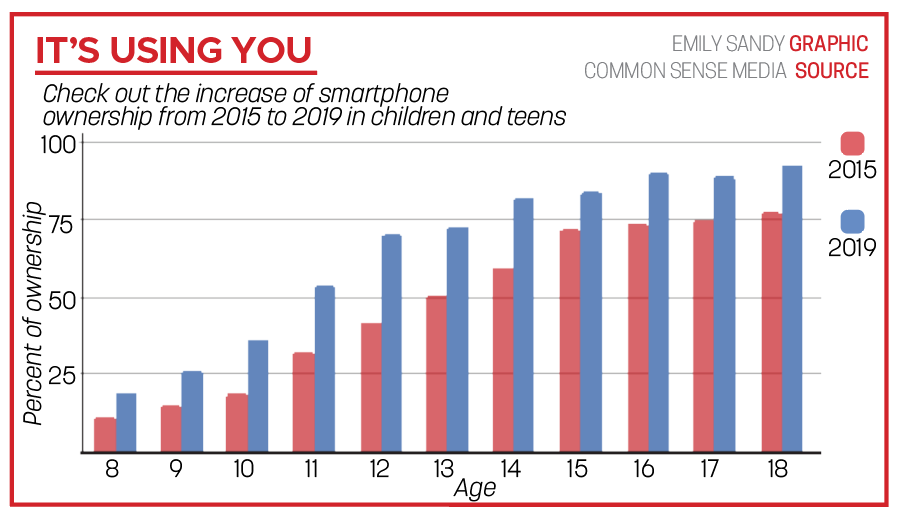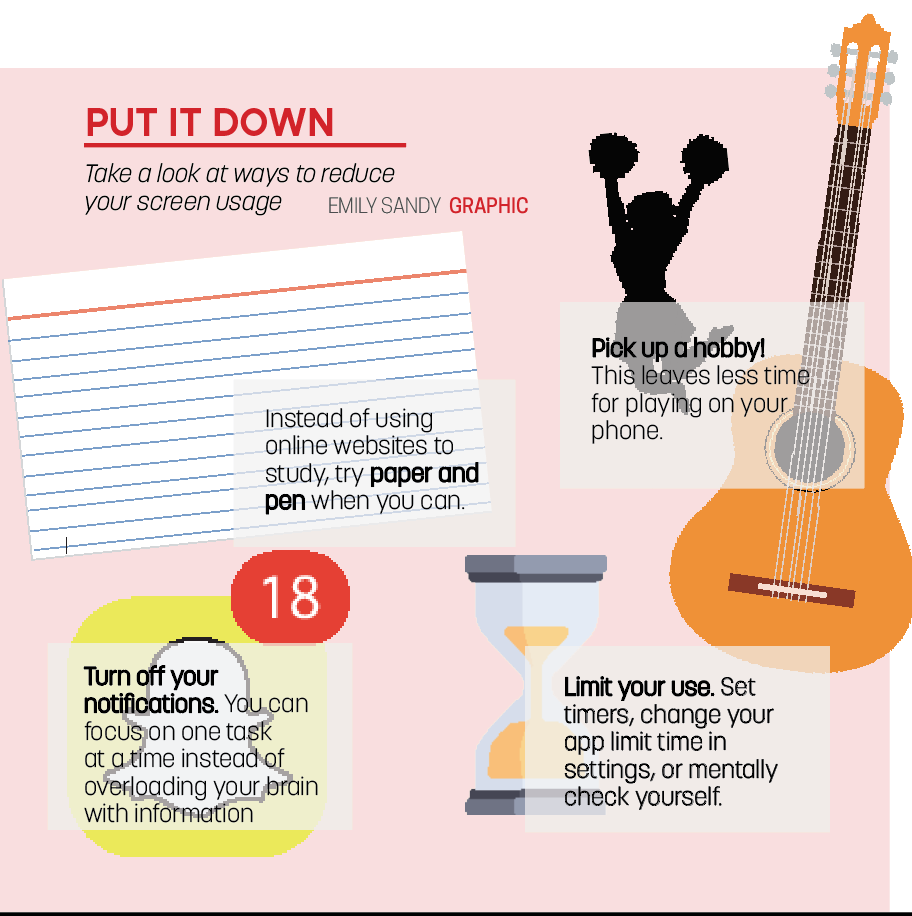Senior Jasmine Hsu is not able to finish her last year at CHS normally. Due to COVID-19, Hsu is facing a new reality as she manages college applications, clubs,and rigorous AP courses as a virtual student. Because of this, technology has become essential to her academic success.
“I feel like, there’s not that large of an emphasis on textbooks anymore just, you know, in this current day and age,” Hsu said. “Everything’s totally online for me, so if I want to do anything I always have to rely on Canvas, rely on iMessage, rely on texting my friends which is all, you know, with socially distancing, there’s no other option than technology.
Hsu is not alone. A 2020 study conducted by the Pew Research Center found that 53% of Americans believe the internet is crucial in the wake of COVID-19. However, she also has to deal with the unintended consequences of excessive technology usage.
“When I’m constantly on my laptop, when I’m constantly on my phone, my head starts to hurt,” Hsu said.

Yet Claire Swigart, hybrid student and sophomore, said immoderate technology utilization affects her in other ways.
“I don’t really get headaches but I do get eyestraining,” Swigart said. “I think being on technology too much and looking at it too much, it like can obviously hurt your eyes and after a while it’s kind of hard to just look at a computer screen like constantly.”
Ultimately, these repercussions are commonplace especially in school-aged children, according to a 2018 American Optometric Association study. Additionally, this study found over 40% of Americans have myopia (nearsightedness), and this percentage is on the rise. Moreover, one in four parents have a myopic child.
Erin Odya, CHS Advanced Science Anatomy and Physiology teacher, said excessive use of technology has various effects on the human body. “There’s physical (effects) too. like people get the back and neck pain from looking down all the time, arthritis, the eye damage from the blue light, the ear (damage) from listening to music too loud, and then (researchers are) starting to see connections with things like heart disease because (people) have a more sedentary lifestyle,” Odya said.
While technology has physical effects, it also impacts psychological health. Stephanie Whiteside, Mental Health Coordinator for Carmel Clay Schools, said while technology can benefit students who utilize it to stay connected with friends due to COVID-19, it may also result in negative effects depending on the circumstances.
“You may have had some students who, because of the lighting of technology or maybe not having a lot of boundaries with it, maybe were staying up late at night which actually could cause there to be some strain and stress caused from that,” Whiteside said.
According to a 2014 Penn State University study, people are less likely to get sufficient sleep and feel more tired in the morning if they use technology before bedtime. This is because it limits the production of melatonin, a hormone that regulates the sleep cycle.
Odya also said technology can result in memory issues. “There is a direct memory issue where the connections made aren’t as strong and there was actually a study (“Google Effects on Memory: Cognitive Consequences of Having Information at Our Fingertips”) where they had class and if (students) knew where they could get the information online later, they didn’t remember it,” Odya said. “All they remembered was where to find it. Whereas the ones where they didn’t give that information, it was like this is the only time you get it, those students remembered that information so much better. So, because we know it’s there, when information is being presented to us, it’s not making as strong of connections in our brain, and so you start to see students having to do more work and needing more repetitions to get things to stick.”


In spite of these detrimental effects, there are ways in which people can limit the consequences of excessive use of technology.
Odya said taking breaks is crucial in reducing its impact. “So, the critical things are to just put (technology) down periodically, especially 30 to 60 minutes before bed,” Odya said. “Then, you’ll get better sleep, and that feeds in with all of the other problems. It kind of helps lessen them, especially the social and emotional ones.” Whiteside also said setting reminders this technique helps people calm their minds and become more mindful.
Swigart said she utilizes blue light glasses to lessen the impact technology has on her eyes. “I feel like they don’t make my eyes so dry when I look at the screen for a very long time,” Swigart said. “The one other thing I do is I like to print a lot of things out, like a lot of instructions and stuff like that so I don’t have to look at the computer screen a ton. It’s nice to change it up.”
As the COVID-19 pandemic has changed the lives of many, CHS students have been facing a new reality. This reality is one in which technology has become critical to the educational success of students.
This story was orignally published on Sept. 21 2020
Click here to watch a video of excessive technology use in the classroom

































![AI in films like "The Brutalist" is convenient, but shouldn’t take priority [opinion]](https://hilite.org/wp-content/uploads/2025/02/catherine-cover-1200x471.jpg)










































![Review: “The Immortal Soul Salvage Yard:” A criminally underrated poetry collection [MUSE]](https://hilite.org/wp-content/uploads/2025/03/71cju6TvqmL._AC_UF10001000_QL80_.jpg)
![Review: "Dog Man" is Unapologetically Chaotic [MUSE]](https://hilite.org/wp-content/uploads/2025/03/dogman-1200x700.jpg)
![Review: "Ne Zha 2": The WeChat family reunion I didn’t know I needed [MUSE]](https://hilite.org/wp-content/uploads/2025/03/unnamed-4.png)
![Review in Print: Maripaz Villar brings a delightfully unique style to the world of WEBTOON [MUSE]](https://hilite.org/wp-content/uploads/2023/12/maripazcover-1200x960.jpg)
![Review: “The Sword of Kaigen” is a masterpiece [MUSE]](https://hilite.org/wp-content/uploads/2023/11/Screenshot-2023-11-26-201051.png)
![Review: Gateron Oil Kings, great linear switches, okay price [MUSE]](https://hilite.org/wp-content/uploads/2023/11/Screenshot-2023-11-26-200553.png)
![Review: “A Haunting in Venice” is a significant improvement from other Agatha Christie adaptations [MUSE]](https://hilite.org/wp-content/uploads/2023/11/e7ee2938a6d422669771bce6d8088521.jpg)
![Review: A Thanksgiving story from elementary school, still just as interesting [MUSE]](https://hilite.org/wp-content/uploads/2023/11/Screenshot-2023-11-26-195514-987x1200.png)
![Review: "When I Fly Towards You", cute, uplifting youth drama [MUSE]](https://hilite.org/wp-content/uploads/2023/09/When-I-Fly-Towards-You-Chinese-drama.png)
![Postcards from Muse: Hawaii Travel Diary [MUSE]](https://hilite.org/wp-content/uploads/2023/09/My-project-1-1200x1200.jpg)
![Review: "Ladybug & Cat Noir: The Movie," departure from original show [MUSE]](https://hilite.org/wp-content/uploads/2023/09/Ladybug__Cat_Noir_-_The_Movie_poster.jpg)
![Review in Print: "Hidden Love" is the cute, uplifting drama everyone needs [MUSE]](https://hilite.org/wp-content/uploads/2023/09/hiddenlovecover-e1693597208225-1030x1200.png)
![Review in Print: "Heartstopper" is the heartwarming queer romance we all need [MUSE]](https://hilite.org/wp-content/uploads/2023/08/museheartstoppercover-1200x654.png)



